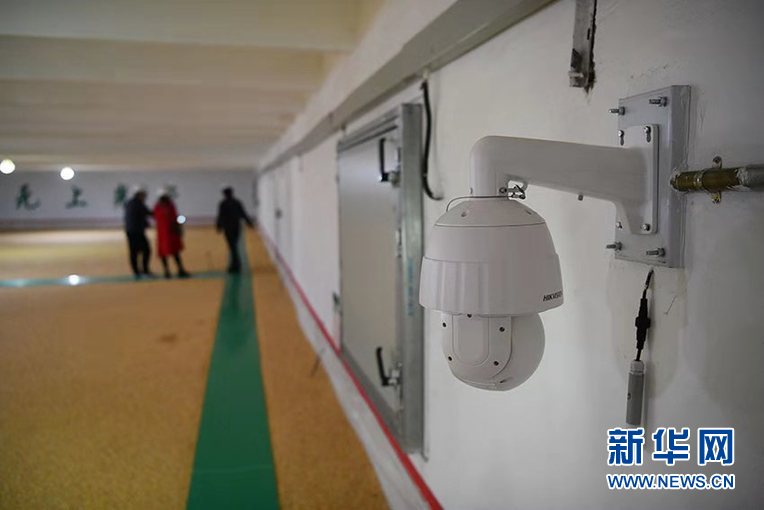

China has established a modernized grain storage system based on information technologies to ensure food security across the country.
Last year, China Grain Reserves Group Ltd. Company (Sinograin) upgraded its grain procurement model by using internet technologies, developing an app through which farmers can make appointments to sell their grains, improving efficiency in grain procurement and helping farmers increase income.

An intelligent camera in a grain storehouse of Sinograin. (Photo/Xinhua)
Farmers can choose grain storehouses nearby and make appointments to sell their grains through the app, said Li Haijie, deputy head of the storage department of the Central Grain Reserves Shunyi Directly Managed Storehouse (Shunyi Storehouse), the storehouse unit of Sinograin in Beijing.
Thanks to the application of information technologies through the whole process, it takes about 40 minutes to store grains, including sampling, weight measurement and unloading, Li noted.
“In the inspection process, quality indicators such as moisture and impurities, as well as food safety indicators including heavy metals and mycotoxins, will be measured. Only quality grains can be stored,” Li added.
As of Aug. 14, the app has 650,000 registered users, who have sold 19 million tons of grains upon appointment, including 6.1 million tons during this year’s procurement period of summer grains, according to data from Sinograin.
Sinograin has also upgraded the science and technology of grain storage. “We now mainly adopt scientific grain storage technologies such as electronic temperature measurement, mechanical ventilation and internal temperature control, as well as daily inspection of grain conditions to ensure the safety of grain storage,” said Li Changliang, a storekeeper of a warehouse of wheat in the Shunyi Storehouse.
He can assess the situation of the grains through changes in grain temperature, thanks to more than 300 temperature measurement points in the warehouse storing over 6,000 tons of wheat.
In general, the average grain temperature of the whole warehouse is below 20 degrees Celsius throughout the year.
A smart integrated control platform can ensure real-time monitoring of grains, as each warehouse is equipped with a comprehensive monitoring system with high-definition monitors.
“We can check real-time situations inside and outside the warehouse through all-weather remote monitoring, ensuring intelligent prediction and early warning of changes in grain conditions through big data analysis and comparison, realizing scientific and green grain storage,” said an employee of the Shunyi Storehouse.
So far, over 98 percent of Sinograin’s more than 980 granaries have realized scientific grain storage, with the percentage of grains that met the required standards remaining above 95 percent.
Sinograin has also established a relatively stable rotation mechanism. It sells out the grains that are close to or just past the storage life, and purchases grains that meet the quality and food safety standards each year to ensure regular storage of fresh grains.
The company is investing more in scientific and technological research, deploying Internet of Things, big data and other technologies to ensure sound management and high quality of China’s grain reserves.
 Fire brigade in Shanghai holds group wedding
Fire brigade in Shanghai holds group wedding Tourists enjoy ice sculptures in Datan Town, north China
Tourists enjoy ice sculptures in Datan Town, north China Sunset scenery of Dayan Pagoda in Xi'an
Sunset scenery of Dayan Pagoda in Xi'an Tourists have fun at scenic spot in Nanlong Town, NW China
Tourists have fun at scenic spot in Nanlong Town, NW China Harbin attracts tourists by making best use of ice in winter
Harbin attracts tourists by making best use of ice in winter In pics: FIS Alpine Ski Women's World Cup Slalom
In pics: FIS Alpine Ski Women's World Cup Slalom Black-necked cranes rest at reservoir in Lhunzhub County, Lhasa
Black-necked cranes rest at reservoir in Lhunzhub County, Lhasa China's FAST telescope will be available to foreign scientists in April
China's FAST telescope will be available to foreign scientists in April "She power" plays indispensable role in poverty alleviation
"She power" plays indispensable role in poverty alleviation Top 10 world news events of People's Daily in 2020
Top 10 world news events of People's Daily in 2020 Top 10 China news events of People's Daily in 2020
Top 10 China news events of People's Daily in 2020 Top 10 media buzzwords of 2020
Top 10 media buzzwords of 2020 Year-ender:10 major tourism stories of 2020
Year-ender:10 major tourism stories of 2020 No interference in Venezuelan issues
No interference in Venezuelan issues
 Biz prepares for trade spat
Biz prepares for trade spat
 Broadcasting Continent
Broadcasting Continent Australia wins Chinese CEOs as US loses
Australia wins Chinese CEOs as US loses